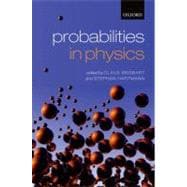
Note: Supplemental materials are not guaranteed with Rental or Used book purchases.
Purchase Benefits
Looking to rent a book? Rent Probabilities in Physics [ISBN: 9780199577439] for the semester, quarter, and short term or search our site for other textbooks by Beisbart, Claus; Hartmann, Stephan. Renting a textbook can save you up to 90% from the cost of buying.
| Notes on the Contributors | p. vii |
| Preface | p. xi |
| Introduction | p. 1 |
| Probabilities in Statistical Physics | |
| Subjective Probability and Statistical Physics | p. 25 |
| An Objectivist Account of Probabilities in Statistical Mechanics | p. 51 |
| The Past Histories of Molecules | p. 83 |
| Entropy: A Guide for the Perplexed | p. 115 |
| Probabilistic Modeling in Physics | p. 143 |
| Probabilities in Quantum Mechanics | |
| Aspects of Probability in Quantum Theory | p. 171 |
| Probabilities in Realist Views of Quantum Mechanics | p. 201 |
| Quantum Probabilities: An Information-Theoretic Interpretation | p. 231 |
| Interpreting Probabilities in Quantum Field Theory and Quantum Statistical Mechanics | p. 263 |
| Philosophical Perspectives | |
| Three Roads to Objective Probability | p. 293 |
| Physics and the Humean Approach to Probability | p. 321 |
| Probability Out Of Determinism | p. 339 |
| Can the World be Shown to be Indeterministic After All? | p. 365 |
| References | p. 391 |
| Index | p. 421 |
| Table of Contents provided by Ingram. All Rights Reserved. |
The New copy of this book will include any supplemental materials advertised. Please check the title of the book to determine if it should include any access cards, study guides, lab manuals, CDs, etc.
The Used, Rental and eBook copies of this book are not guaranteed to include any supplemental materials. Typically, only the book itself is included. This is true even if the title states it includes any access cards, study guides, lab manuals, CDs, etc.